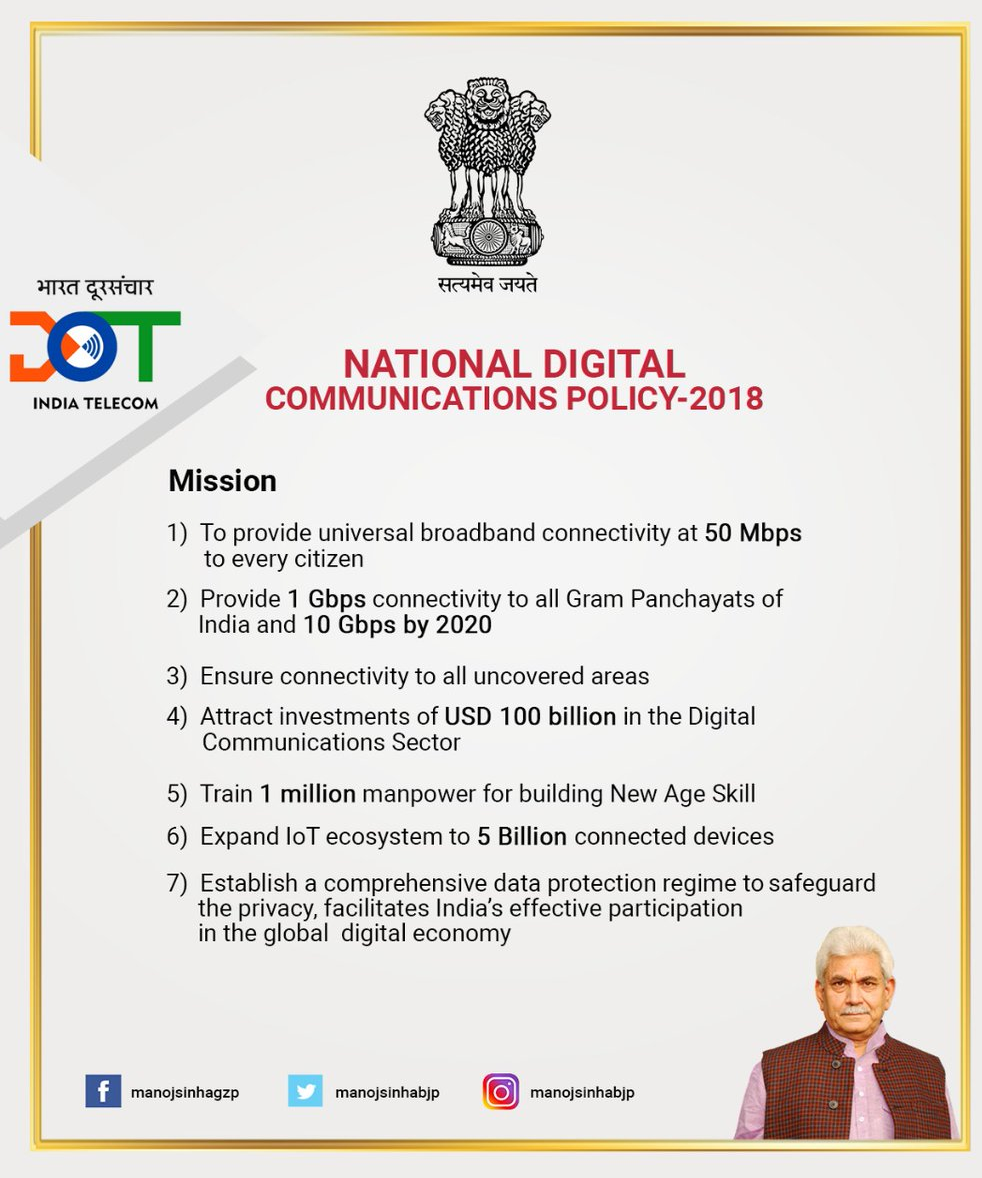

New telecom policy aims to provide broadband access to all citizens by 2022
Issue
Context
- The Union Cabinet chaired by Prime Minister NarendraModi has approved National Digital Communications Policy (NDCP)2018.
- National Digital Communications Policy 2018 replaces the existing National Telecom Policy-2012 to cater to the modern needs of the digital communications sectorof India.
- Cabinet has also decided to re-designate the Telecom Commission as “Digital Communications Commission”.
Background
- As the present world has entered into the era of modern technological advancements in Telecom Sector such as 5G, Internet of things (loT), Machine to machine (M2M) communication , a need was felt to introduce customer focused and application driven policy for Indian telecom sector.
- The policy’s aims to serve as the main pillar of Digital India by addressing emerging opportunities for expanding not only availability of telecom services, but also telecom based services.
About
Key objectives of the policy to be achieved by 2022:
- Broadband for all.
- Creating four million additional jobs in digital communications sector.
- Enhancing contribution of digital communications sector to 8% of India’s GDP from approx. 6% in 2017.
- Propelling India to Top 50 nations in ICT Development Index of ITU from 134 in 2017.
- Enhancing India’s contribution to Global Value Chains.
- Ensuring digital sovereignty.
Key Provisions of the policy
- NDCP 2018 aims to provide universal broadband connectivity at 50 Mbps to every citizen.
- Provide 1 Gbps connectivity to all Gram Panchayats by 2020 and 10 Gbps by 2022.
- Ensure internet connectivity to all uncovered areas.
- Attract investments of US $100 billion in Digital Communications Sector.
- Train 1 million manpower for building New Age Skill.
- Expand IoT ecosystem to 5 billion connected devices.
- Establish comprehensive data protection regime for digital communications that safeguards privacy, autonomy and choice of individuals
- Facilitate India’s effective participation in global digital economy;
- Enforce accountability through appropriate institutional mechanisms to assure citizens of safe and
- Secure digital communications infrastructure and services.
Key Strategy of the Policy
NDCP 2018 advocates:
- Establishment of a National Digital Grid by creating a National Fibre Authority.
- Establishing Common Service Ducts and utility corridors in all new city and highway road projects.
- Creating a collaborative institutional mechanism between Centre, States and Local Bodies for Common Rights of Way, standardization of costs and timelines.
- Removal of barriers to approvals.
- Facilitating development of Open Access Next Generation Networks.
Analysis
Significance
The NDCP 2018 envisions supporting India’s transition to digitally empowered economy and society by fulfilling information and communications needs of citizens and enterprises.
In pursuit of accomplishing these objectives by year 2022, the National Digital Communications Policy, 2018 envisages three Missions:
- Connect India: Creating Robust Digital Communications Infrastructure
- To promote Broadband for All as a tool for socio-economic development, while ensuring service quality and environmental sustainability.
- Propel India: Enabling Next Generation Technologies and Services through Investments, Innovation and IPR generation
- To harness the power of emerging digital technologies, including 5G, AI, IoT, Cloud and Big Data to enable provision of future ready products and services; and to catalyse the fourth industrial revolution (Industry 4.0) by promoting Investments, Innovation and IPR.
- Secure India: Ensuring sovereignty, safety and security of digital communications
- To secure the interests of citizens and safeguard the digital sovereignty of India with a focus on ensuring individual autonomy and choice, data ownership, privacy and security; while recognizing data as a crucial economic resource.
Thus, the job of a national policy on digital communications is to prepare the country and its citizens for the future.
Achieving these goals would require that the key stakeholders – namely the Centre, the States, local governments, Telecom Service Providers, Internet Service Providers, handset and equipment manufacturers, the academic community, the innovators and start-ups come together to forge a coalition to deliver this national policy and missions.
It is hoped that this policy will facilitate the unleashing of the creative energies of citizens, enterprises and institutions in India and play a seminal role in fulfilling the aspirations of all Indians for a better quality of life.
Learning Aid
Mission Objectives:
Practice Question:
- What is the new National Digital Communications Policy-2018? Discuss its objectives. Also, discuss how the policy aims to achieve the objective of digital sovereignty in India.


